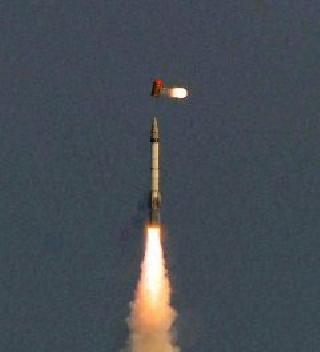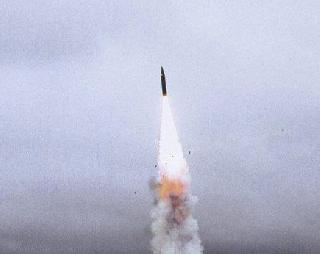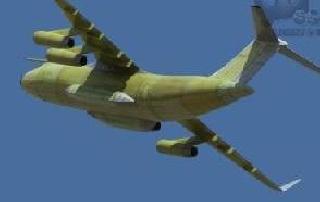
India's missile, BO5 being launched from an approximate depth of about 50 metres, from an underwater platform at Bay of Bengal on Sunday. A PTI photo
NEW DELHI (PTI): India has made a major stride towards completing its nuclear triad capability by successfully test firing a nuclear-capable ballistic missile from an underwater platform in the Bay of Bengal.
Completion of the nuclear triad will give India the ability to fire nuclear-tipped missiles from land, air and sea. This is the first missile in the underwater category to have been fully developed by India and can be launched from a submarine.
"The medium range K-15 ballistic missile was test fired successfully on Sunday from an underwater pontoon and all parameters of the test firing were met," Defence Research and Development Organisation (DRDO) chief V K Saraswat told PTI from an undisclosed test area.
Officials said more than 10 trials of the missile had been carried out earlier. Sunday's was the last development trial of K-15.
Only a select few nations including the US, France, Russia and China have this type of missile capability, they said.
The development phase of the K-15 missile, which comes in the category of submarine-launched ballistic missile (SLBM), was over and it was now ready for deployment on various platforms including the around 6,000-tonne indigenous nuclear submarine INS Arihant which is under development, Saraswat said.
K-15 is part of the family of underwater missiles being developed by DRDO for the Indian strategic forces' underwater platforms. The missile, which is also known as BO5, has been developed by DRDO's Hyderabad-based Defence Research and Development Laboratory (DRDL).
This missile will help India to achieve the capability of launching nuclear warheads from underwater facilities. So far, India had the capability of delivering nuclear weapons from land and aerial platforms only.
"This is a significant development and capability enhancement. The launch of the SLBM is a complex technological development. And now since the missile is ready for induction, this is a major punctuation in India's indigenous missile development programme," said security expert Commodore (retd) Uday Bhaskar.
Another security expert Commander (retd) Sunil Chauhan said the development has helped India achieve a significant milestone for country's strategic forces. This success will give countervailing capability, he said.
Defence analyst Deba R Mohanty said by achieving the nuclear triad, India will certainly be on the upward trajectory of becoming a global military power in the real sense.
India has a no-first-use policy for nuclear weapons and the development of an SLBM boosts its retaliatory strike capability, experts said.
DRDO is also developing more underwater missiles like BRAHMOS with a strike capability of 290 kilometres.
India has for some time possessed the Agni series of ballistic missiles as well as fighter-bomber aircraft to constitute the land and air-based legs of the nuclear triad.
On April 19, last year, India had taken a giant leap in the missile field when it test-fired nuclear-capable Agni-V Inter-Continental Ballistic Missile that has brought China within its reach with a strike range of over 5000 km. This missile also gives India the capability to hit targets in Eastern Europe, east Africa and the Australian coast.
Defence Minister A K Antony congratulated DRDO for the successful launch of K-15 ballistic missile.
The missile, which is also known as BO5, has been developed by DRDO's Hyderabad-based Defence Research and Development Laboratory (DRDL).
 Previous Article
Previous Article Next Article
Next Article













The Indian Air Force, in its flight trials evaluation report submitted before the Defence Ministry l..
view articleAn insight into the Medium Multi-Role Combat Aircraft competition...
view articleSky enthusiasts can now spot the International Space Station (ISS) commanded by Indian-American astr..
view article